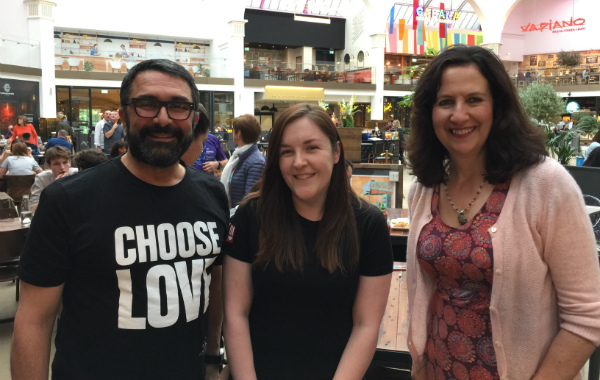
“A speech therapist? I get tongue-tied all the time, maybe you can help me out!” “A speech therapist? So you will be teaching everyone to speak the proper Queen’s English then?” “A speech therapist? So will you cure people who stutter, like in The King’s Speech?”
These are a few of the common responses I get when I tell people I am studying to be a speech and language therapist. Yes, stuttering is something SLTs can help with, but these ideas cover such a small part of what we do.
I’m Caryn, 25, from Glasgow, and I have just finished my first year studying speech and language therapy at the University of Manchester. I was lucky enough to complete my first placement at an in-patient unit for deaf individuals with mental health needs – this gave me my first real taste of BSL, and also highlighted the desperate need for SLTs (and health professionals in general) who can communicate using BSL.
I’ve always been interested in BSL, although I’ve never really encountered it in my daily life before my placement. I was required to learn a few basics to get by with the patients and staff – greetings, how to introduce myself, how to offer a cup of tea, fingerspelling, etc. – but by the time the placement was over I was hooked, and I am aiming to complete my Level 1 BSL qualification.
During my time on placement I shadowed an SLT who had learned BSL for her role in the unit. She had a visit from a long-standing patient from outside the unit, who had a severe hearing loss and communicated primarily with BSL, but who met with the SLT on a regular basis to work on his speech. He was so motivated to improve that he had successfully learned the phonetic alphabet, which allowed him to isolate the sounds he struggled with the most. He wanted his speech to be as strong as possible as he was a keen world traveller, mainly travelling alone and hitchhiking across countries where he could. He told me that so many more hearing people in America speak ASL than hearing people in the UK speak BSL, and since looking into sign language further I have noticed the same. It seems to me that BSL is becoming more widely known, but that a massive gap still exists between the hearing and deaf communities.
The crux of an SLT’s mission is to improve communication. And yes, this means working with those who stutter, with those suffering from aphasia, with those who have had brain injuries. However, communication is not exclusively for the hearing population, and therefore I feel there is a real need for SLTs who can communicate using BSL. While completing some background research about the unit for my placement, I was shocked to find that the facility was only one of three in the UK who cater for deaf patients with mental health needs – despite mental health problems being more prevalent in those with hearing loss. Action on Hearing Loss reported recently that patients with hearing loss remain in hospital significantly longer, on average, than hearing patients. It has also been shown that deaf people are more likely to be incorrectly diagnosed as having learning difficulties. These problems are due to the distinct lack of appropriate support – there are very few mental health workers, and medical professionals in general, who can communicate in BSL and who have an insight into deaf culture. Learning of this current state of affairs, alongside shadowing an excellent SLT bridging this gap, has really driven me to learn BSL and to champion communication across the board – I hope I can contribute to bridging this gap in my own career as an SLT.
To support myself during university I am a waitress, and since my placement I have been able to communicate with a few hearing impaired customers using my (very limited!) BSL skills. I met Jane and Hormoz when they visited the restaurant and I plucked up the courage to introduce myself in BSL. They were fantastically encouraging, and I managed to pick up a few more (food related!) words in BSL during their meal.
It was an amazing feeling to communicate with people in a way I wasn’t able to a few months ago, and this has really spurred me on to bring BSL into my career as an SLT.
Caryn Molloy
@carynmolloy